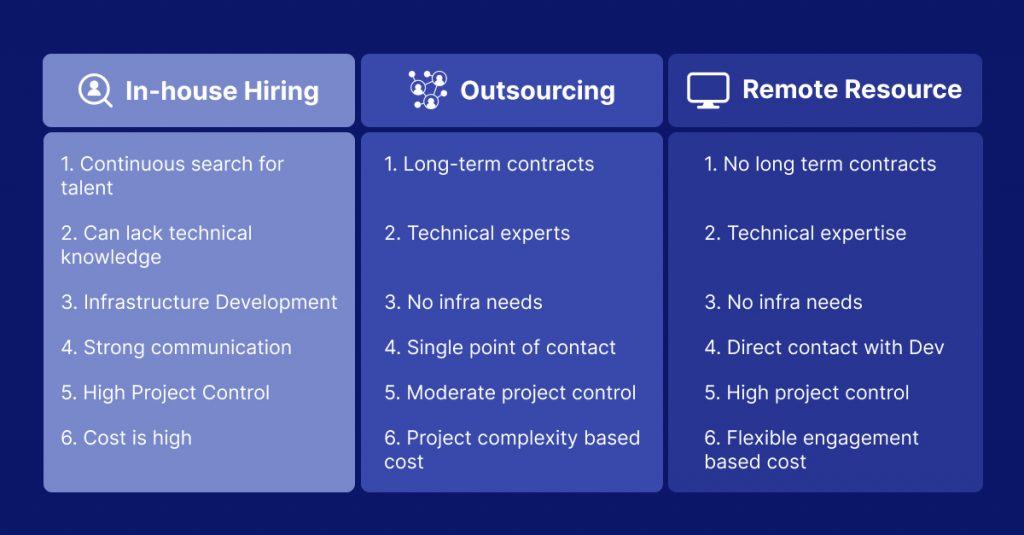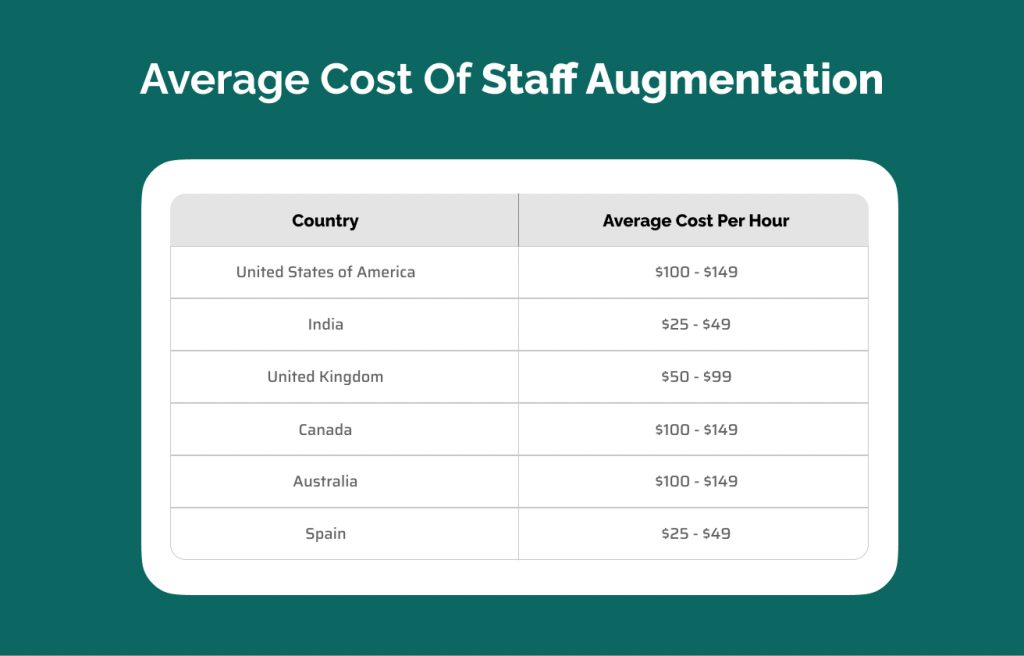The rising era of virtual operations is pushing businesses towards expanding their technical teams through Offshore Development. The prospect of tapping into a global talent pool and achieving cost efficiencies makes offshore development an attractive option.
The way software development works is changing, and more people are looking into offshore solutions. It seems like a good idea because it can save money and give access to different skills. But, there are some tricky parts that can be risky for businesses.
When entrepreneurs dive into offshore development, they often get caught up in the complex details. Choosing the right offshore developers is not just a business move—it’s a big decision that needs careful thought. That’s where Resourcifi comes in, helping businesses navigate the challenges of software development offshoring with clear and standardized operations.
Offshore development can be tricky, and there are risks that might slow down operations, use up money, or mess up project timelines. That’s why it’s so important for businesses to make smart decisions. Resourcifi has been there for many businesses, using its experience to guide them through offshoring challenges and ensuring a successful transition.
One of the main issues businesses face is not having enough information. This guide is here to help with that. It’s like a handbook for entrepreneurs who want to get into software development offshoring. It goes beyond the basics, giving deep insights, proven strategies, and practical tips to make offshore development smoother.
Starting with the basics, the guide looks at possible problems businesses might face when setting up successful offshore development teams. It’s not just about avoiding issues; this guide is about helping entrepreneurs make choices that lead to long-term success. When businesses make smart offshore software outsourcing decisions, they help everyone grow, building a stronger and more connected global community.
Understanding Offshore Development
In the business world, knowing about offshore development is crucial. Offshoring means getting work done by a team outside your country. In this case, we are specifically talking about offshoring software development.
Businesses, especially in top-tier countries, often choose offshore development. Why? Because major Tier-1 countries have been facing an economic challenge known as overemployment.
Major Tier-1 countries have ample job opportunities but the skilled population is already employed. Thus creating a need for offshore talent to fill the skill gap in those countries. Apart from that another main reason is saving money.
As living expenses in third-world countries are lower thus making talent cost less for offshore team development. It’s like hiring the right experts for the right job without worrying about where they live.
Finding Talented People Globally
Offshore development is a money-saver. It lets companies take advantage of cost differences between countries. This means they can use their budget more wisely and focus on their main tasks.
Besides saving money, it allows businesses to tap into a diverse talent pool worldwide. This diversity helps in building teams with different skills tailored to specific projects. It speeds up work and brings in new ideas.
Common Setbacks with Offshore Development
However, going down the offshore road isn’t a walk in the park. There are challenges, such as problems in communication, assuring the quality of work, dealing with time zone differences, and handling legal matters.
Talking effectively becomes tricky due to distance. So, having clear communication methods and using tools for collaboration is a must.
Ensuring the software’s quality is another challenge. While there’s a big talent pool, maintaining consistent quality in the code becomes harder. This is where setting clear expectations and having strong quality checks come in handy.
Time zones can cause coordination problems, and legal issues add another layer of complexity. So, having solid contracts that protect everyone’s interests is vital.
In this complex world of offshore development, businesses need to be careful. They must find the right balance between saving money, accessing global talent, and overcoming challenges. This balance is the key to a successful journey into offshore development.
Tips for a Successful Offshore Development Journey
Exploring offshore development needs a plan. Choosing the right partner is crucial. Looking at their reputation, skills, adherence to rules, and flexibility is a good start.
Creating effective communication channels is a must. It includes making project requirements clear, talking regularly, being aware of cultural differences, and having plans for handling crises.
Quality is non-negotiable. Strict testing, constant monitoring, and fixing issues along the way make sure the final product is top-notch.
Legal matters should be crystal clear. Strong contracts, protecting ideas, and deciding where legal stuff applies are part of the game. Calculating the total cost, looking at the return on investment, and thinking about future growth are also important.
Getting along with people from different cultures is a big deal. Doing team-building activities and making everyone aware of each other’s cultures help everyone work together smoothly.
Making sure data is safe and having a secure system is a must for cybersecurity. Ongoing support and thinking long-term about partnerships are the final steps for a successful journey.
In a nutshell, understanding offshore development means facing challenges while enjoying its benefits. Businesses can make the most of it by being smart, transparent, and working together in a collaborative and creative way.
Offshore Development Market Overview 2024
A comprehensive understanding of the market trends is indispensable for entrepreneurs looking forward to offshore development. As of 2024, the off shore development market is marked by significant growth. Thus offering both challenges and opportunities for businesses looking to optimize their software development processes.
The top software development offshoring destinations continue to play a pivotal role in the global offshore software outsourcing landscape. Countries like India, China, Malaysia, and the Philippines dominate the offshore development market.

India, renowned for its vast pool of skilled IT professionals, remains a frontrunner, capturing over 50% of the global outsourcing market. The Philippines, with its English proficiency and strategic location, has emerged as a preferred destination for customer service and non-technical tasks.
60% Uptake By Global Businesses
The offshore development market has witnessed a remarkable surge, with an estimated 60% of companies incorporating offshoring into their operational frameworks. This statistic underscores a paradigm shift in how businesses approach software development, highlighting the widespread recognition of the benefits offered by offshoring.
Startups Embracing Offshoring
Contrary to conventional perceptions, it’s not just established enterprises that are turning to offshoring. Startups, with their nimble and innovative approaches, constitute a significant portion. These budding ventures leverage offshoring to access skilled talent without the burden of hefty operational costs, providing them with a competitive edge in the market.
Medium to Large Enterprises Leading the Charge
While startups contribute to the rising wave of offshoring adoption, medium to large enterprises remain the primary torchbearers of this trend. Companies with established market positions are keenly aware of the advantages software development offshoring brings, especially in terms of cost savings, scalability, and efficient resource allocation. The scale of these enterprises allows them to tap into offshore talent pools for complex and large-scale projects.
Geographical Agnosticism
One of the driving factors behind the surge in software development offshoring adoption is the diminishing emphasis on geographical proximity. Companies are increasingly becoming agnostic to geographical constraints, recognizing that talent and expertise can be harnessed from across the globe. This shift is facilitated by advancements in technology, robust communication infrastructure, and the growing prevalence of remote work practices.
Diversification Across Industries
92% of the world’s top 2000 public companies rely on offshore software outsourcing for their daily operations, underscoring the critical role of technology services sourced from abroad. From healthcare and finance to e-commerce and technology, businesses in various sectors are actively engaging off shore development teams. This diversification reflects the adaptability of offshoring practices to meet the distinct needs and challenges of different industries.
Adapting to Market Dynamics
In conclusion, the statistics on companies adopting offshoring underscore a fundamental shift in the approach to software development. The prevalence of this trend across diverse business sizes and industries reflects a collective recognition of offshoring’s potential to drive efficiency, innovation, and competitiveness in an increasingly interconnected and globalized world. As companies continue to adapt to dynamic market conditions, software development offshoring stands out as a strategic imperative for those aiming to stay at the forefront of the evolving software development landscape.
Why Do Companies Choose Offshore Software Development?
The decision to opt for offshore software development companies over in-house hiring or traditional outsourcing is rooted in several compelling reasons. Firstly, cost efficiency remains a paramount factor. Offshore development allows businesses to tap into skilled talent at a fraction of the cost compared to hiring in-house teams. Moreover, it offers flexibility in scaling resources up or down based on project requirements.
Access to a diverse and specialized talent pool is another key driver. Offshore development hubs, particularly in countries like India and Ukraine, boast a rich repository of IT professionals with expertise in various technologies. This enables companies to match specific project requirements with the right skill sets.
Time-to-market acceleration is a crucial consideration in the fast-paced tech industry. Offshore development allows companies to expedite project timelines by working across different time zones. While in-house teams may be limited by geographical and time constraints, offshore teams can ensure continuous progress on projects, contributing to quicker delivery.
Strategic focus is also a factor in the decision-making process. Companies can concentrate on their core competencies by outsourcing non-core functions to offshore software teams. This not only enhances overall efficiency but also allows in-house teams to focus on strategic initiatives and innovation.
The importance of risk mitigation in 2024 is quite a need in terms of offshore development. By diversifying operations across geographies, entrepreneurs can mitigate risks associated with single-point dependencies. This proactive approach empowers businesses to navigate challenges with confidence, knowing that their development processes are not susceptible to localized disruptions.
The choice of offshore software development companies is driven by a combination of factors. These factors include cost efficiency, access to specialized talent, accelerated time-to-market, and strategic focus.
As the offshore development company market continues to evolve, businesses are finding innovative ways to leverage these advantages and stay competitive in the ever-changing landscape of software development.
Common Pitfalls To Avoid Before Getting an Offshore Team
Embarking on an offshore development journey is a strategic move for entrepreneurs seeking efficiency and cost-effectiveness. However, navigating this path is not without its challenges. Understanding and mitigating these common pitfalls is essential for a successful offshore software engagement.
Communication Barriers
Effective communication is the starting reason for successful offshore software development collaborations. Failure to establish clear channels can lead to misunderstandings and project derailment. Utilizing collaboration tools and fostering regular engagement helps bridge the communication gap. This proactive approach ensures that expectations are aligned and potential issues are addressed promptly.
Failure to Understand the Scope of the Project
One of the primary pitfalls is a lack of clarity regarding project requirements and deliverables. Entrepreneurs should prioritize defining the scope with precision. Drafting a Software Requirements Specification (SRS) document becomes instrumental in ensuring a shared understanding between the onshore and off shore software development teams. This documentation serves as a roadmap, minimizing the risk of project drift.
Code Quality Challenges
Setting and communicating clear expectations for code quality is paramount. Failure to do so can result in subpar work that jeopardizes the project’s success. Implementing robust quality assurance processes is necessary. This includes regular code reviews, testing protocols, and adherence to industry best practices. Prioritizing code quality from the outset prevents costly rework and ensures the delivery of a reliable product.
Ambiguity of Stakeholders
Consistent project ownership is vital for smooth execution. Entrepreneurs must ensure that key stakeholders are actively involved and committed. Having a dedicated team with a clear understanding of the project’s objectives fosters accountability and minimizes the risk of direction shifts. Stakeholder involvement also helps in addressing issues promptly, ensuring a streamlined development process.
Loopholes When Signing the Contract
The contract is the legal foundation of any offshore software development collaboration. Rushing through this crucial step can lead to various issues down the line. Best practices for drafting a comprehensive outsourcing contract involve clearly defining deliverables, milestones, and payment schedules. Entrepreneurs should also ensure transparency to avoid misunderstandings, and legal experts should review the contract to identify and address potential loopholes.
Navigating these pitfalls requires diligence and a proactive approach from entrepreneurs. By prioritizing effective communication, precise project scope definition, stringent quality assurance, stakeholder involvement, and robust contractual agreements, entrepreneurs can set the stage for successful offshore collaborations.
Research indicates that a significant percentage of offshore software development projects encounter challenges due to communication issues. With up to 57% of businesses experiencing delays and disruptions due to communication barriers.
In contrast, projects with well-defined scopes and clear expectations have a 30% higher success rate. Code quality challenges contribute to approximately 40% of project failures, highlighting the critical importance of establishing and enforcing quality standards.
The ambiguity of stakeholders and ineffective contracts are cited as major contributors to project delays and disputes, emphasizing the need for thorough preparation and legal scrutiny.
Hence we need to address these common pitfalls through strategic planning and meticulous execution. Entrepreneurs can maximize the benefits of offshore development while minimizing risks.
How To Ensure A Successful Partnership With Offshore Development Company
Embarking on an offshore software development partnership requires a strategic approach. Entrepreneurs must navigate key factors to ensure success in collaboration. Let’s delve into essential steps and insights for forging a prosperous alliance with offshore development companies.
1. Create A List Of Potential Partners
Embarking on an offshore software development partnership requires a strategic approach. In 2024, examining client testimonials provides valuable insights into the reputation of potential partners. A strong track record demonstrates reliability, offering a foundation for a successful collaboration.
Assessing technical capabilities is crucial. Potential partners must showcase industry-specific experience, aligning with your project needs. This careful evaluation ensures that the chosen partner possesses the expertise required for a fruitful collaboration.
Flexibility in collaboration is key. In 2024, varied engagement models enhance adaptability to changing project dynamics. This strategic approach sets the stage for a partnership that can evolve with the dynamic landscape of your business.
2. Build Effective Communication Channels
Communication lies at the heart of successful partnerships. In 2024, detailed documentation of project requirements minimizes misunderstandings, ensuring alignment with project objectives. This clarity becomes the cornerstone for a collaborative and effective working relationship.
Utilizing project management tools is essential for seamless communication. Regular meetings, both scheduled and ad-hoc, foster collaboration and keep all stakeholders in the loop. This ensures that everyone is on the same page, reducing the chances of miscommunication.
Sensitivity to cultural nuances is crucial. In 2024, understanding and addressing cultural differences will become integral to building a collaborative relationship. Navigating these differences with respect and openness contributes to effective teamwork.
3. Ensure Quality Assurance
Quality assurance is paramount in offshore development. In 2024, incorporating comprehensive testing, including unit testing, integration testing, and user acceptance testing, upholds quality standards. This commitment to quality becomes a distinguishing factor for a successful partnership.
Adopting iterative development cycles is a best practice. Agile methodologies ensure constant feedback, refining processes for optimal outcomes. This iterative approach fosters continuous improvement and adaptability to evolving project requirements.
Proactively identifying bottlenecks is crucial. In 2024, continuous improvement strategies become a proactive means of maintaining high performance. This commitment to ongoing optimization ensures the delivery of a high-quality product.
4. Mitigate Legal and Contractual Risks
Crafting detailed contracts is foundational. In 2024, clearly defining the scope of work, milestones, and deadlines minimizes the potential for disputes. This clarity in contractual agreements lays the groundwork for a transparent and trustworthy partnership.
Ensuring ownership of code and assets is paramount. Leverage non-disclosure agreements for enhanced legal protection. These legal safeguards become essential elements in building trust and security within the partnership.
Choosing an appropriate legal jurisdiction is a strategic decision. In 2024, understanding international legal frameworks becomes crucial for ensuring a secure and legally sound partnership. This strategic foresight mitigates risks associated with legal complexities.
5. Evaluate the Total Cost of Ownership
Looking beyond hourly rates is essential. In 2024, considering hidden costs and assessing long-term maintenance and support expenses will provide a holistic view of total ownership costs. This comprehensive evaluation is key to making informed investment decisions.
Balancing cost and quality is a delicate art. In 2024, projecting long-term benefits aids in making informed investment decisions. This strategic approach ensures that the partnership delivers value for the investment made.
Planning for future growth is strategic. In 2024, flexibility in scaling resources ensures adaptability to evolving business needs. This forward-looking approach is fundamental for a partnership that can grow alongside your business.
6. Cultural Integration and Team Dynamics
Fostering a collaborative work environment is foundational. Encouraging teamwork through team-building activities and promoting open communication fosters a positive working environment. This inclusive approach contributes to a harmonious and productive team dynamic.
Promoting diversity and inclusion is crucial. In 2024, cross-cultural sensitivity workshops enhance team cohesion. This commitment to understanding and respecting diverse perspectives contributes to a rich and collaborative team culture.
7. Cybersecurity Measures
Protecting sensitive data is non-negotiable. Implementing data encryption protocols and ensuring compliance with cybersecurity standards safeguard critical information. These measures are foundational for building trust and security.
Conducting regular security audits is proactive. In 2024, employee training on cybersecurity best practices will fortify the overall infrastructure. This commitment to proactive cybersecurity measures ensures a robust and secure digital environment.
8. Post-Development Support and Maintenance
Establishing ongoing support agreements is foundational. In 2024, regular updates and maintenance become crucial for addressing unforeseen issues promptly. This commitment to continuous support ensures the longevity and reliability of the developed product.
Evaluating the potential for continued collaboration is strategic. In 2024, the scalability of support offshore development services enhances long-term partnerships. This forward-looking approach ensures that the partnership evolves with the changing needs of the business.
In conclusion, a strategic and well-rounded approach is vital for a successful partnership with offshore development firms. Each of these aspects plays a crucial role in laying the foundation for a collaborative, efficient, and enduring relationship. By prioritizing these elements, entrepreneurs can navigate the complexities of offshore collaborations and unlock the full potential of their partnerships.
Common Mistakes By Businesses While Hiring Offshore Developers
In terms of offshore software outsourcing, businesses often make common errors that can be detrimental to their projects. Recognizing and avoiding these pitfalls is crucial for entrepreneurs seeking successful collaborations with offshore developers.
1. Focusing Solely on Cost
One prevalent mistake is prioritizing cost over other crucial factors. While outsourcing is renowned for cost-effectiveness, fixating solely on this aspect can lead to subpar results. Entrepreneurs risk hiring a team that may not meet their standards, resulting in delays, rework, and collaboration challenges.

Cost should be a consideration, but a balanced approach that also evaluates expertise and quality is paramount. This prevents potential issues that might impact product development and overall quality.
2. Insufficient Research
Lack of thorough research is another misstep. Entrepreneurs may face challenges later in projects due to inadequate research about their offshore development partners. Rushing through options without comprehensive assessments can lead to mismatched expectations, delayed timelines, and potential collaboration issues.
To mitigate this, detailed research should encompass market analysis, cultural understanding, partner background checks, portfolio reviews, and authentic references. Multistep interviews ensure a deeper understanding of the offshore team’s work ethics.
3. Neglecting Technical Consultation
Non-tech founders often skip consulting technical experts before hiring. Seeking a second opinion and scalability analysis from engineers is crucial. This step ensures alignment between the proposed team, project plan, and the business’s scalability needs.
By engaging technical experts early, businesses prevent potential technical challenges and ensure the chosen team aligns with the project’s technical requirements.
4. Overlooking End Users
Sometimes, businesses focus too narrowly on their needs and overlook the end users. It’s essential to hire a team capable of satisfying both business requirements and end-user needs. Ignoring the user perspective can result in a product misaligned with user expectations, affecting its overall success.
Businesses must prioritize user-centric development to create products that resonate with their target audience, ensuring long-term success and user satisfaction.
5. Setting Unrealistic Expectations
Unrealistic expectations can be detrimental to offshore collaborations. Businesses may anticipate offshore teams to mirror in-house working styles, leading to productivity hindrances. Offshore teams may have different processes and working styles, requiring adaptation.
Setting realistic goals and acknowledging the challenges of working with global teams is essential. This ensures alignment in expectations and fosters a more productive and understanding working relationship.
6. Ignoring Cultural Differences
While cultural differences are anticipated in offshore software development services, some discrepancies can become problematic. If values and visions don’t align, conflicts may arise, wasting time in conflict resolution. To avoid this, businesses should select teams with shared values, making partnerships healthier and more efficient.
Understanding and respecting cultural nuances enhance collaboration, preventing potential conflicts and streamlining project progress.
7. Micromanagement
Micromanagement is counterproductive, particularly in the creative realm of software development. Offshore teams should be trusted to work independently, avoiding micromanagement pitfalls. Constant validation-seeking after every milestone can hinder creativity and project flow.
Choosing an offshore software development services team with a proven track record of independent and efficient work mitigates micromanagement issues, ensuring smoother project execution.
8. Unclear Project Requirements
Clarity in project requirements is foundational. Unclear or ambiguous requirements lead to roadblocks, affecting project success. The project scope can significantly shift, resulting in cost overruns, miscommunication, and delays.
Involving product experts and business analysts from the outset ensures precise communication of project details and vision. This clarity is essential for maintaining project integrity and success.
By steering clear of these common mistakes, entrepreneurs can elevate their software offshore app development experience, ensuring a smoother collaboration, and maximizing the benefits of offshore software outsourcing in terms of cost, efficiency, and quality.
Management Mistakes Done By Businesses
Businesses often grapple with management mistakes that can impede the success of their projects in terms of offshore development. Understanding and avoiding these pitfalls is crucial for entrepreneurs to effectively navigate the challenges associated with offshore app development partnerships.
The “Build Now, Fix Later” Approach
One common misstep is adopting a rushed development strategy, pushing teams to prioritize speed over foundational quality. This “Build Now, Fix Later” approach accumulates technical debt, leading to long-term issues that can compromise the project’s integrity.
Balancing planned technical debts and bug rectification, while avoiding an excessive accumulation of technical debt, is vital. Regular refactoring and optimization ensure sustained project quality.
Zero Offshore Team Stability
Frequent changes within offshore development teams can have adverse effects on project quality and stability. Every developer brings a unique working style, and unnecessary disruptions can result in disjointed code, disrupted workflows, and increased recruitment costs.
Stability fosters institutional knowledge retention, minimizing recruitment costs and maintaining consistent project quality over time.
Major Communication Barriers
Clear communication is the linchpin of successful collaborations for offshore software development services. Failure to establish a robust communication strategy can lead to misunderstandings, delays, and project instability.
Defining meeting schedules, and communication channels, and identifying points of contact are essential steps. A well-defined organizational structure ensures effective communication throughout the project lifecycle.
Not Trusting Offshore Teams
Building trust with offshore development teams is paramount for effective collaboration. The absence of face-to-face communication can sometimes lead to trust issues, hindering project progress. Trust in the offshore app development team’s abilities is vital for project completion within deadlines and fostering long-term partnerships.
Establishing trust involves consistent communication, meeting project milestones, and demonstrating reliability. Managers should actively build confidence in the offshore team’s capabilities.
To overcome these management challenges, entrepreneurs must adopt proactive strategies that prioritize quality, stability, and effective communication. By doing so, they can enhance the success and longevity of their software offshore development partnerships, ensuring the realization of their project goals.
Parting Thoughts
Venturing into offshore development requires savvy decision-making. Understanding the rise in outsourcing, the significance of choosing reliable developers, and the potential pitfalls can set entrepreneurs on the right path.
Exploring the advantages of offshoring, like cost savings and global talent access, unveils a world of opportunities. However, being aware of communication challenges, ensuring quality, and addressing legal issues are vital steps.
Partnering with software offshore development firms demands a strategic approach. Reputation, technical expertise, compliance, and flexible engagement models play pivotal roles in building successful collaborations. Establishing clear communication channels, rigorous testing, legal safeguards, cost evaluations, and cultural integration contribute to project success.
Acknowledging common mistakes, such as a sole focus on cost, inadequate research, and neglecting cultural differences, is crucial. The takeaway is a cautious approach to offshore development, emphasizing thorough understanding and meticulous planning.
This journey, as outlined, empowers entrepreneurs to not only navigate complexities but also build enduring global development strategies. It’s about making informed choices, fostering collaboration, and ensuring success in offshore development decisions.
For more technically strategic decision-making, entrepreneurs should partner with experts. Resourcifi is an acclaimed offshoring partner that has been helping many businesses across the Globe. Contact us now.








































